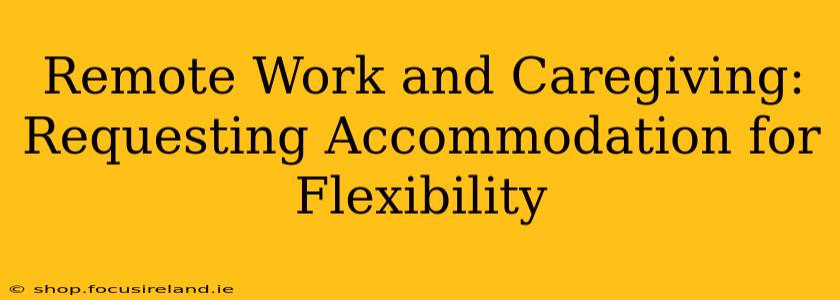Juggling remote work and caregiving responsibilities can feel like a constant tightrope walk. Many caregivers find themselves needing flexibility in their work schedules to manage the demands of caring for children, elderly parents, or other dependents. Fortunately, requesting reasonable accommodations for this situation is often possible, and understanding the process can significantly ease the burden. This comprehensive guide will walk you through the steps involved, providing you with the confidence and knowledge to navigate this important conversation with your employer.
What are Reasonable Accommodations for Caregivers?
Before making a request, it's vital to understand what constitutes a "reasonable accommodation." This generally refers to modifications or adjustments to your work environment or schedule that allow you to perform your job duties despite your caregiving responsibilities. These accommodations are designed to be mutually beneficial, enabling you to continue contributing effectively while maintaining a balance in your life. Examples include:
- Flexible work hours: Starting and ending your workday earlier or later, or taking breaks throughout the day to attend to caregiving needs.
- Compressed workweeks: Working longer hours on fewer days to create more flexibility during the week.
- Telecommuting: Working from home, either full-time or part-time, to better manage caregiving demands.
- Remote work options: Utilizing technology to participate in meetings or collaborate with colleagues remotely.
- Job sharing: Sharing responsibilities with another employee to reduce individual workload.
It's crucial to remember that the specifics of a reasonable accommodation will vary depending on your individual circumstances, your job responsibilities, and your employer's operational capabilities.
How to Request a Reasonable Accommodation for Caregiving
The process of requesting a reasonable accommodation can feel daunting, but a well-structured approach can make it much smoother. Here’s a step-by-step guide:
-
Gather Documentation: While not always required, having documentation to support your caregiving responsibilities can strengthen your request. This might include medical records, school schedules, or other relevant documents.
-
Prepare a Formal Request: Your request should be in writing, clearly stating your needs and explaining how they relate to your caregiving responsibilities. Be specific about the accommodations you're seeking and why they're necessary. Mention the impact these adjustments would have on your ability to perform your job effectively.
-
Submit the Request to the Appropriate Person: Determine the correct contact person within your organization – this is usually your HR department or your direct supervisor.
-
Engage in Interactive Dialogue: Be prepared for a conversation with your employer to discuss the feasibility of your request. Be open to exploring alternative solutions and work collaboratively to find a mutually agreeable arrangement.
-
Maintain Documentation: Keep copies of your request, any communications with your employer, and any agreements you reach. This will be important if you need to revisit the discussion later.
What if My Request is Denied?
If your request is denied, understand your rights. Many countries have laws that protect employees from discrimination based on caregiving responsibilities. Inquire about the reasons for denial and consider seeking legal counsel to explore your options.
What if My Employer Doesn't Understand My Needs?
Educating your employer about the challenges of caregiving is important. Highlight the impact effective caregiving has on your work performance and how accommodations can foster a positive and productive work environment. Many employers value loyalty and are willing to cooperate to retain skilled and valuable employees.
Can I Request Accommodations for Unexpected Caregiving Needs?
Yes, you can usually request accommodations for unexpected caregiving needs, such as a child's illness or a family emergency. However, be prepared to provide necessary documentation and discuss the temporary nature of your request.
What are My Legal Rights Regarding Caregiver Accommodations?
The legal protections available to caregivers vary depending on your location. Familiarize yourself with the laws and regulations in your area, specifically those relating to employment discrimination and reasonable accommodations for employees with family responsibilities. Consulting with an employment lawyer can provide valuable insight into your legal rights.
This information is for general guidance only and doesn't constitute legal advice. Always consult with legal professionals for advice tailored to your specific situation and location. Remember, open communication, clear documentation, and a collaborative approach are key to successfully navigating the process of requesting and securing reasonable accommodations for your caregiving responsibilities.

